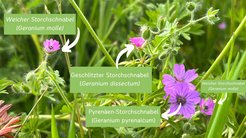What exactly is a species?
Research team proposes new definition approach using AI

(pug) What is a species? From the Greek philosopher Aristotle to Charles Darwin to the present day, sci-entists have dealt with this fundamental question of biology. Contrary to public perception, however, it is still largely unresolved. Scientists from the Max Planck Institute for Biogeochemistry in Jena, the Technical University of Ilmenau and the University of Göttingen have now presented a new approach for the identification and delimitation of species using artificial intelligence (AI). The study has been published in the journal Trends in Ecology and Evolution.
The research team proposes a modern integrative classification of species that combines the discovery of genetic entities with the integration of automatically extracted information such as morphology, physiology, ecology or behavior to describe species as natural entities. This process is called species delimitation. “In this way, artificial intelligence can help accelerate the decoding of biodiversity on an unprecedented scale,” says first author Kevin Karbstein, who received his doctorate from the University of Göttingen and now works at the Max Planck Institute for Biogeochemistry and the Ilmenau University of Technology.
“This is necessary because new genomic and integrative approaches show that traditionally described species cannot be natural entities,” says Karbstein. This applies in particular to groups of animals, plants and fungi that are characterized by complex evolutionary processes such as hybridization, polyploidy or asexuality. “We now know that speciation can be a very complex process,” adds Natascha Wagner from the University of Göttingen. “However, this network-like evolution is hardly taken into account in current concepts.”
In their study, the researchers highlight the challenges of integrative taxonomy, based on different data sets from genomics, morphology and ecology, among others. The scientists state that there are currently over 30 different species concepts. There is also a lack of universal characteristics and markers as well as suitable analysis tools for large data sets in order to delimit and describe species. In addition, complex evolutionary processes can only be mapped to a limited extent and the integration of data to describe species depends heavily on the respective authors.
This press release was provided by the University of Göttingen.












